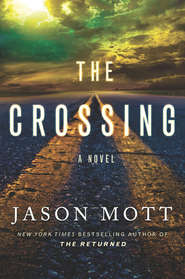По всем вопросам обращайтесь на: info@litportal.ru
(©) 2003-2024.
✖
The Returned
Автор
Год написания книги
2018
Настройки чтения
Размер шрифта
Высота строк
Поля
Jim Wilson was a young man, barely past thirty-five, blond hair, broad shoulders, a stiff, square chin. He looked like the kind of man who was always building something. Always engaged in some manner of productivity. Always furthering the slow crawl of humanity’s progress against the perpetual hunger of entropy. This was why the town had loved him so in life. He had been what the people of Arcadia were supposed to be: polite, hardworking, well mannered, Southern. But now, as one of the Returned, he reminded them all of what they had not known they could be.
“You’re all walking up to the big question,” Jim said in a low voice, “the one you asked earlier on tonight and left hanging out there. The question about what’s to be done with us.”
Pastor Peters interrupted. “Now, now. There’s nothing ‘to be done with you.’ You’re people. You need a place to live. We’ve got room for you.”
“They can’t stay here forever,” someone said. Voices in the crowd grumbled in agreement. “Something’s got to be done with them.”
“I just wanted to say thank you,” Jim Wilson said. He had planned to say so much more, but it was all gone now—now that the entirety of Arcadia was staring at him. Some of them staring a bit less friendly than others. “I just...I just wanted to say thank you,” Jim Wilson repeated. Then he turned and, taking his family with him, exited the same way he had come.
After that, everyone seemed to have trouble finding what to ask or what to say or what to argue about. Folks milled about for a while, grumbling and whispering now and again, but to no real consequence. Everyone felt suddenly tired and burdened.
Agent Bellamy gave everyone a final round of reassurances as they began trickling out of the church. He shook their hands and smiled as they passed and, when they asked him, he would say that he would do everything he could to understand why all of this was happening. He told them he would stay “until things are sorted out.”
The sorting out of things was what people expected from the government, so they put their fears and suspicions away for now.
Eventually there was only the pastor, his wife and the Wilson family, who, not wishing to cause any more problems than they already had, stayed quietly in their room in the back of the church—away from everyone’s sight and remembrance—as if they had never returned at all.
* * *
“I imagine Fred had a fair amount of things to say,” Harold said as Lucille settled into the truck. She wrestled with Jacob’s seat belt, huffing and making hard movements with her hands.
“They’re just all so...so...irregular!” The click of Jacob’s seat belt punctuated her sentence. She turned the knob at the window. After a few hard tugs, it broke free and opened. Lucille folded her arms over her chest.
Harold turned the truck’s ignition. It started with a roar. “Your mama’s been biting her tongue again, I see, Jacob. Probably sat there that whole meeting not saying nothing, didn’t she?”
“Yes, sir,” Jacob said, looking up at his father with a smile.
“Don’t you do that,” Lucille said. “Just don’t you two do that!”
“She didn’t get a chance to use any of her fancy words, and you know what that does to her, don’t you? You remember?”
“Yes, sir.”
“I’m not playing with you two,” Lucille said, fighting laughter in spite of herself. “I’ll get out right now and you’ll never see me again.”
“Did somebody else get to use a really fancy word?”
“Doomsday.”
“Oh...that. It’s a fancy way word for sure. ‘Doomsday’ is what happens when you spend too much time in church. That’s why I don’t go.”
“Harold Hargrave!”
“How’s the pastor? He’s a good Mississippi boy, in spite of his religion.”
“He gave me candy,” Jacob said.
“That was nice of him, wasn’t it?” Harold asked, wrestling the truck up the dark road toward home. “He’s a good man, ain’t he?”
* * *
The church was quiet now. Pastor Peters came into his small office and settled at the dark, wooden table. In the distance, a truck was gurgling down the street. Everything was simple, and that was a good thing.
The letter lay in the drawer of his desk, beneath stacks of books, assorted papers needing his signature, sermons in various stages of completion and all the general clutter that slowly marches over an office. In the far corner, an old lamp stood throwing a dim, amber glow over the room. Lining the walls of the office were Pastor Peters’s bookcases, all of them stacked beyond capacity. His books gave him little comfort these days. A single letter had undone all their work, stripped away all the comfort that words can offer.
The letter read:
Dear Mr. Robert Peters,
The International Bureau of the Returned would like to inform you that you are being actively sought after by one of the Returned by the name of Elizabeth Pinch. As is our policy in this situation, no information outside the family of the Returned is ever given. In most cases, these individuals seek out their families first, but Miss Pinch has expressed a desire to locate you. Per Code 17, Article 21, of Returned Regulations Policy, you are hereby notified.
Pastor Peters stared down at the letter and was, just as he had been upon first reading it, uncertain of everything in his life.
Jean Rideau
“You should be with a young woman,” she told Jean. “She would be able to keep up with you during all of this.” She settled onto the small, iron-framed bed, huffing. “You’re famous now. I’m just an old woman in the way.”
The young artist crossed the room and knelt beside her. He rested his head in her lap and kissed the inside of her hand, which only made her aware of the wrinkles and liver spots that had begun showing upon that hand in recent years. “It’s all because of you,” he said.
He had been a part of her life for over thirty years—since she was fumbling her way through college so long ago and had come across the work of an overlooked artist who died by running into traffic one balmy summer’s night in 1921 Paris—and now she had him, had not only his love, but his flesh, as well, completely. And that frightened her.
Outside, the street had finally quieted. The crowd had been scattered by the policemen.
“If I had only been this famous years past,” he said. “Perhaps my life would have been different.”
“Artists are only ever appreciated posthumously.” She smiled, stroking his hair. “Nobody ever expected one would return to redeem his accolades.”
She spent years studying his work, his life, never imagining that she would be here with him, like this, smelling the scent of him, feeling the wiry texture of a beard he desperately wanted but had always had poor luck growing. They sat up nights, talking about everything but his art. The press was doing enough of that. Jean Rideau: Return of the Artists, one of the more popular headlines had proclaimed.
He was the first of the artistic deluge, the article declared. “A genius sculptor returns! Not long before the masters are back with us!”
So he was famous now. Work he’d made nearly a hundred years ago, work that never sold for more than a few hundred francs, now went for millions. And then there were the fans.
But all Jean wanted was Marissa.
“You kept me alive,” he said, nuzzling his head into her lap like a cat. “You kept my work alive when no one else knew me.”
“I’m your steward, then,” she said. With her wrist, she pushed loose strands of her hair from her face—hair that was a bit more gray and a bit more thin each day. “Is that what I am?”
He looked up at her with calm, blue eyes—even in the grainy, black-and-white photos of him that she had studied for years, she had known they were this particular, beautiful blue. “I do not care about our ages,” he said. “I was only an average artist. I know now that my art was meant to lead me to you.”
Then he kissed her.
Five
IT HAD BEGUN small, as most large things do, with just one government-issue Crown Victoria containing only one government man and a pair of too-young soldiers and a cell phone. But all it had taken was that one phone call and a few days of things being moved around and now Bellamy was entrenched in the school but there were no students, no classes, nothing but the ever-growing numbers of cars and trucks and men and women from the Bureau who had been setting up shop here for the past several days.
The Bureau had developed a plan for Arcadia. The same isolation that had kept the town’s economy stifled for all the years of its existence was exactly what the Bureau was looking for. Sure, there were hotels and restaurants and facilities and resources in Whiteville that the Bureau could use for what they were planning, but there were also people. Close to fifteen thousand of them, not to mention the highway and all the various roads that they might have to secure sometime soon.







